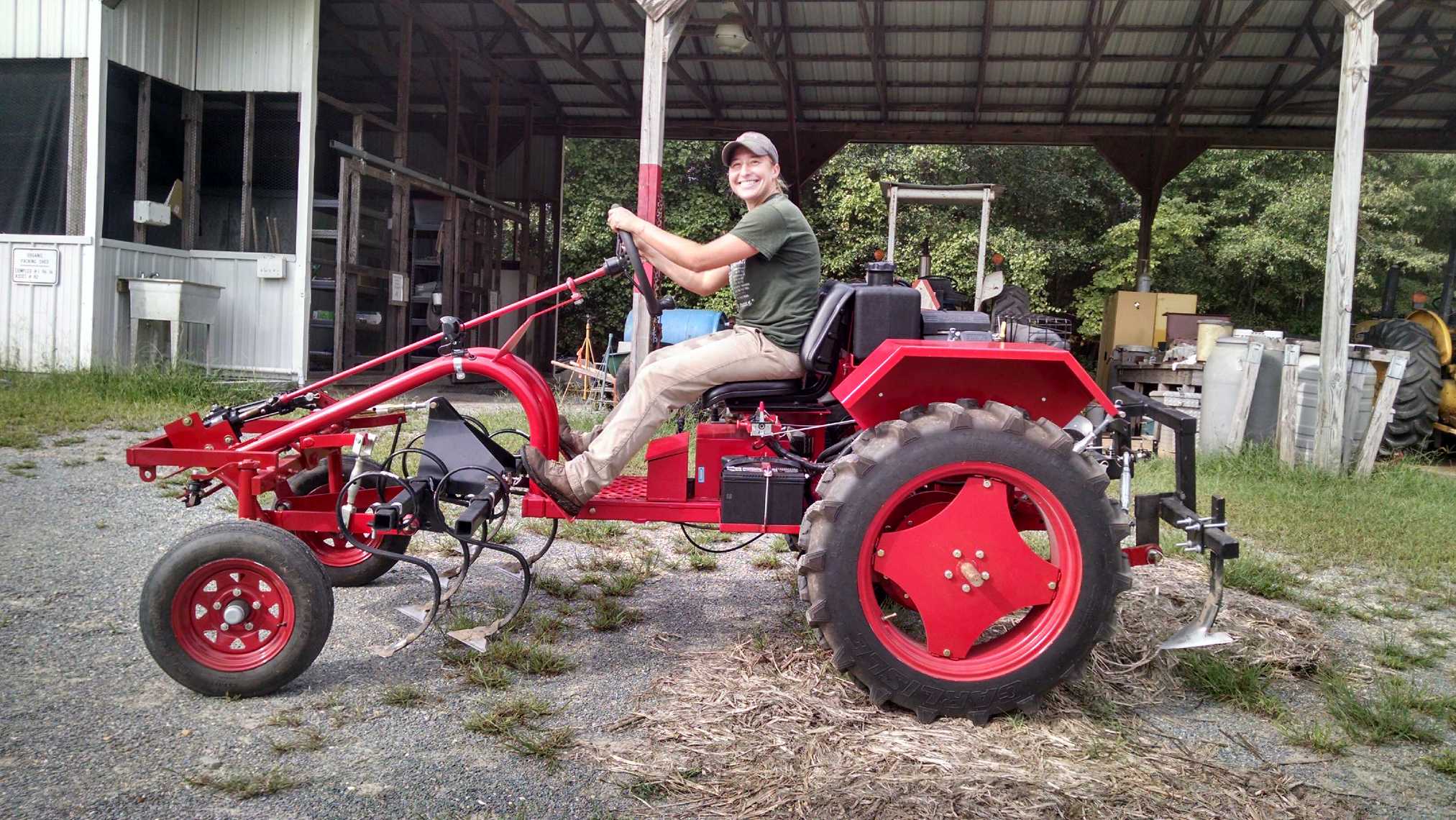By Suzannah Schneider, Communications Manager and Certification Coordinator
Kayla Clark, former apprentice with the Center for Environmental Farming Systems (CEFS), was all smiles on Oggún
You’ve likely heard of the tractor disrupting the industry: it’s called “Oggún.”
CleBer’s Oggún Iron Horse tractor is an open-source, modern replica of the Allis G that’s revolutionizing farming around the globe. The company is also a Business Ally of Certified Naturally Grown!
This modern cousin of the Allis Chalmers Model G incorporates new features such as hydrostatic transmission, 3-point hitch, zero-turn radius, and an optional PTO. It’s great for bed preparation, mowing, transplanting, and cultivating.
The tractor is designed specifically for small-scale, direct-market farms. It can be built with off-the-shelf parts that can be purchased from multiple vendors. The tractor’s Open System Manufacturing (OSM) model means the CleBer/Oggún gives the design and parts lists to all customers. The simple technology means that a mechanic with a basic understanding of tractor service can execute repairs.
We spoke with Founder Horace Clemmons to learn the story behind this innovative tractor, and what’s ahead for the game-changing company. Welcome to the CNG Business Allies community, CleBer/Oggún!
Are you interested in featuring your like-minded company on our blog?
Certified Naturally Grown (CNG): How did CleBer/Oggún get started?
Horace Clemmons (HC): My business partner, Saul Berenthal, was born in Cuba, and left when he was 16. He always said, “One of these days, we are going to start a business in Cuba.”
We met over four decades ago when we were working for IBM, and then decided to start our own cash register software company to compete with giants of the industry. The key to our success was to create open software, not subject to licenses, which anyone could use. We changed the rules of the market.
We saw an opportunity in Cuba in December 2014, after Presidents Raúl Castro and Barack Obama announced they were opening a new chapter in bilateral relations. To support food sovereignty for the island, we sought to create a company that manufactures medium-sized tractors to help Cuban producers be more efficient.
Like our previous work, the Oggún tractor is based on an Open Source Manufacturing Model (OSMM). This means that is can be assembled from a base group of modular off-the-shelf components that are readily available in a wide variety of markets and from different suppliers. This way, not only is the tractor more adaptive to the needs of small-scale farmers, but servicing and maintenance becomes easier since parts and components are internationally available and interchangeable between different machines.
CNG: What are CleBer/Oggún’s core values?
HC: To ensure that the money stays where the work is done.
Farmers at Stone Barns Center in NY cultivating with an Oggún tractor
CNG: How does Certified Naturally Grown support CleBer/Oggún’s customers?
HC: You encourage agroecology much as we do.
CNG: What are some exciting developments at CleBer/Oggún our CNG community can look forward to in the future?
HC: We have announced Oggún II, and are working to convince the Land Grant Universities to establish guidelines for scalable equipment and implements that can move up and down the scale from hand tool farming to tractor farming. We also aim to produce the tractor in each country where they’ll be sold with locally sourced parts. This will control freight costs, and stimulate the regional economy.
CNG: If you had a magic agricultural wand, how would you use it to improve farm systems in America?
HC: I would have every farmer use agroecology methods and create implements and equipment based on an Open System architecture, much like computers and software are today.
I truly believe that everyone wants to understand that we can’t focus on farming as a vertical model. We have to have the technology and link all the regional merchants together. We’ve got to fix the regional economy. Shoe stores, artists, and farmers all have to have the software infrastructure available to them for time and convenience.
…are you interested in featuring your like-minded company on our blog?


